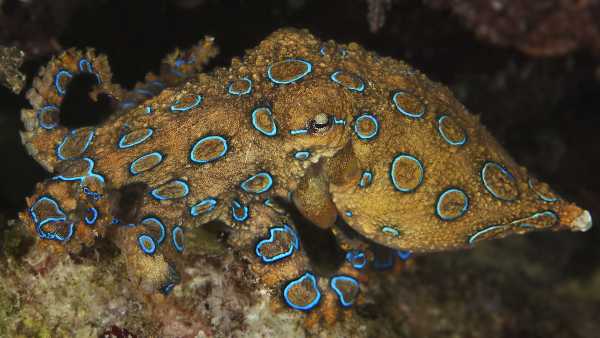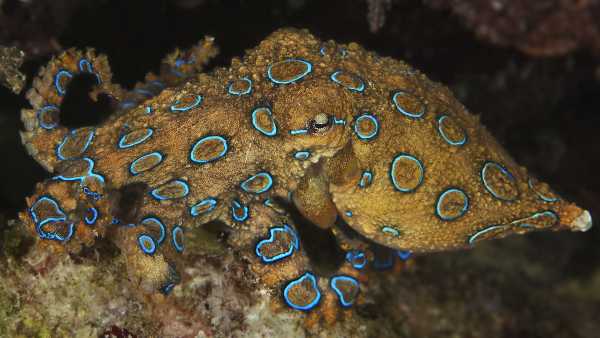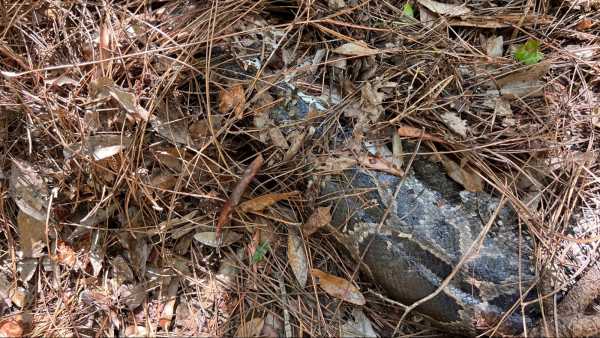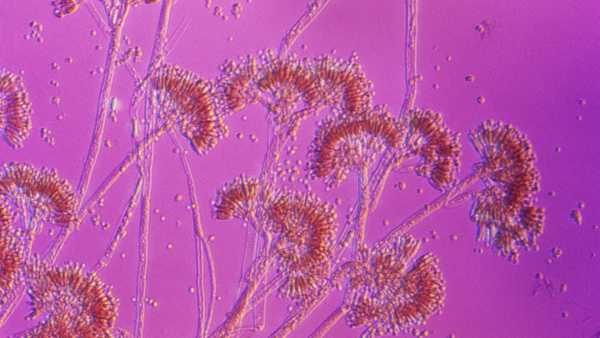
Timber rattlesnakes have potent venom, but rarely bite humans unless provoked or stepped on. (Image credit: Kristianbell via Getty Images)
A Tennessee tourist recently died after being bitten by a rattlesnake and suffering a rare allergic reaction to the snake's venom, reports say.
Emergency responders were dispatched to a trailhead at Savage Gulf State Park on Aug. 8. Medics performed CPR on the man and transported him to a hospital, where he died. The man's identity has not been released.
Witnesses said the hiker picked up a rattlesnake that bit him on the arm, Matthew Griffith, director of the Grundy County Emergency Management Agency, told Live Science. The snake is believed to be a timber rattlesnake (Crotalus horridus), a species with potent venom but that rarely bites people unless provoked or stepped on.
You may like
-

Australian Man Dies From Rare Rabies-Like Disease
-

Hunter's rare allergy meant he could no longer eat red meat.
-

Why is the blue-ringed octopus so dangerous?
“It is believed that the tourist had an allergic reaction, however, the exact cause of death is not being released,” Griffith said in an email.
Venomous snakebites are rarely fatal in the United States. According to the Centers for Disease Control and Prevention (CDC), about 7,000 to 8,000 people are bitten by venomous snakes each year, and only about five of those are fatal. Most deaths occur because of an immediate anaphylactic reaction or because the victim fails to seek medical attention.
According to the Tennessee Wildlife Agency, timber rattlesnakes are the largest and most dangerous venomous snakes in Tennessee. They have a massive body and can grow to about 5 feet in length. Other venomous snakes in the state include pygmy rattlesnakes (Sistrurus miliarius), copperheads (Agkistrodon contortrix), and water snakes (Agkistrodon piscivorus).
These snakes use their venom for hunting and defense. Timber rattlesnakes typically feed on small mammals such as squirrels and rats, but will also occasionally hunt birds and reptiles. This species is an ambush predator, lying motionless at the base of trees or near fallen logs, waiting for prey to pass by. According to the Centers for Disease Control and Prevention (CDC), rattlesnakes can strike quickly from any position and do not always vocalize before biting.
According to the Arizona-Sonora Desert Museum, timber rattlesnakes are not aggressive toward people and avoid contact with people and pets whenever possible. If they do bite, there is a small chance that no venom will be injected. According to the Arizona-Sonora Desert Museum, this is called a “dry bite” and accounts for about 20% of all rattlesnake bites that are self-defense.
Snake venom is a complex mixture of proteins, the composition of which varies greatly between species and populations. Rattlesnakes are vipers, and their venom is typically hemotoxic, affecting the circulatory system. According to the Natural History Museum in London, hemotoxic venom causes bleeding and disrupts blood clotting. However, rattlesnake venom can also be neurotoxic, affecting the nervous system. Timber rattlesnakes are known to have properties of both types, and may have extremely potent neurotoxic venom that lacks the typical hemorrhagic effect of rattlesnakes. Rattlesnake venom is also cytotoxic, destroying tissue.
RELATED STORIES
— We are finally closer to creating a universal antivenom that is effective against bites of cobras, kraits and black mambas, say researchers.
—Diagnostic dilemma: Black widow spider venom poisons woman through eyeball.
— A drug based on spider venom is designed to reverse the damage caused by a heart attack.
William Sutton, a professor at Tennessee State University who studies snakes, told The New York Times that an allergic reaction to snake venom can be similar to an allergic reaction to a bee sting and can cause anaphylaxis, in which a person's airways narrow and blood pressure drops.
Although rattlesnake bites are usually not fatal if treated properly, the venom can have long-term effects. About 10 to 44 percent of victims experience long-term injuries, such as the loss of part or all of a finger.
Griffith warned outdoor enthusiasts to be wary of poisonous snakes and not to handle them.
“As always, it is highly recommended to have first aid supplies with you when outdoors and be aware of wildlife and the dangers some of them may pose,” Griffith said. “If you encounter a snake, simply remain calm and do not attempt to handle it. If bitten, seek immediate medical attention.”

Patrick Pester, Social Links Navigator, Popular News Writer
Patrick Pester is a popular news writer for Live Science. His work has appeared on other science sites such as BBC Science Focus and Scientific American. Patrick transitioned to journalism after working for zoos and wildlife conservation organisations earlier in his career. He received a Master's Excellence Scholarship to study at Cardiff University, where he completed an MA in International Journalism. He also completed a second MA in Biodiversity, Evolution and Conservation in Action at Middlesex University in London. When he's not writing news, Patrick is an investigator into the sale of human remains.
You must verify your public display name before commenting.
Please log out and log back in. You will then be prompted to enter a display name.
Exit Read more

Australian Man Dies From Rare Rabies-Like Disease

Hunter's rare allergy meant he could no longer eat red meat.

Why is the blue-ringed octopus so dangerous?

The man was stabbed in the throat and base of the skull by a fish.

Florida lynx bites head off 13-foot Burmese python in Everglades

American woman dies of prion disease after being injected with infected virus 50 years ago. Health News

FDA warns of possible radioactive shrimp

Keratin Derived From Sheep Wool Restores Teeth, Making Breakthrough

Man's preference for 'soft' bacon may have caused his brain to become infected with worms

New Brain Implant Can Decipher Human 'Inner Monologue'

An FDA panel has questioned the safety of antidepressants during pregnancy. Here's what the science really says.

You May Not Be Allergic to Penicillin. Here's How to Know If You Are. Latest News

Where can you see the total lunar eclipse on September 7, the “blood moon”?

FDA warns of possible radioactive shrimp

Keratin Derived From Sheep Wool Restores Teeth, Making Breakthrough

New Brain Implant Can Decipher Human 'Inner Monologue'

Rocket-shaped jellyfish, majestic Komodo dragons and a harrowing whale rescue – meet the stunning finalists of the 2025 Marine Photographer of the Year competition

Rare 'Black Moon' Rising This Weekend: What Is It and What Can You See? LATEST ARTICLES

1Where can you see the total lunar eclipse “blood moon” on September 7?
Live Science is part of Future US Inc., an international media group and leading digital publisher. Visit our corporate website.
- About Us
- Contact Future experts
- Terms and Conditions
- Privacy Policy
- Cookie Policy
- Accessibility Statement
- Advertise with us
- Web Notifications
- Career
- Editorial Standards
- How to present history to us
© Future US, Inc. Full 7th Floor, 130 West 42nd Street, New York, NY 10036.
var dfp_config = { “site_platform”: “vanilla”, “keywords”: “type-news-trending,serversidehawk,videoarticle,van-enable-adviser-
Sourse: www.livescience.com





